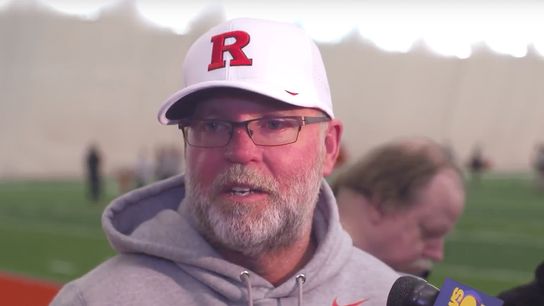The AFCA general session talks, in the main ballroom before thousands of coaches, are usually slacks-and-sports coat affairs for the speakers, but not for Jerry Kill. Don't get me wrong, Kill did dress up; he donned a blue button-down shirt, complimented by jeans, boots and a ball cap. (I assume the spit cup was hidden behind the lectern.) I felt like I was watching my father-in-law up there.
Dressed in his Las Cruces tuxedo, Kill spun 40 minutes of wisdom accrued from a 40-year climb up the windward side of the college football mountain.
A linebacker for NAIA Southwestern College in Winfield, Kan., Kill spent the first 15 years of his career either in high school ball or Division II. His first Division I job, at FCS Southern Illinois, came as head coach. His first FBS job, at Northern Illinois, came as head coach. His first Power 5 job, at Minnesota, came as -- you guessed it -- head coach.
Counting his 4-game interim stint at TCU, Kill served as the head coach at seven different schools in seven different conferences. He let all seven with a .500 record or better. The man knows a thing or three about building a winning football team.
Speaking at at the AFCA convention earlier this month, one got the feeling the principles Kill used to build a 10-5 team at New Mexico State in 2023 weren't all that different from how he built Saginaw Valley State back in 1994.
"We didn't talk about winning," the 175-game winner said. "We talked about standards."
Those standards:
-- Be on time. On time in Kill's programs meant five minutes early. (I was honestly surprised it wasn't 10.) Latecomers had to run "Kill Hill." Two-time latecomers hit the Hill with their position group. Three-timers brought the whole team with them.
-- Go to class. Kill participated in class checks himself, partly because the schools he worked at often lacked the staffing to for him to outsource the task, and partly to send the message. "When the head coach starts checking class, the cell phones come out," Kill said. "'The old shit's out!' We had kids running in pajamas."
-- Act right. The behavioral expectations that other organizations use hundreds of words to outline, Kill's teams did in two. Pretty self-explanatory.
-- Play your ass off. Again, it speaks for itself.
Though Kill's standards remained immune to change, his approach adapted with the times. He liked dancing in the locker room after big wins, something he probably didn't do back in the 1990s.
"Thought I was going to break my damn leg," Kill joked.
Few, if any, of Kill's six head coaching jobs would've been considered plum jobs relative to their peers. (I won't pretend to be an expert on the state of Midwest Intercollegiate Football Conference in the mid-1990s; the most likely reality is that there were no plum jobs in the league at that time, just varying degrees of challenging.)
Kill's keys to building a winning program apply whether or not a program wins or loses the resources game:
1) Make sure the first thing you do is hire a great staff.
2) You better have a good strength coach. "He's got to understand you're lifting for football," Kill said, pointing to the fact that New Mexico State suffered no major injuries in his two years as proof of the difference between lifting to endure the rigors of a football season and lifting to look good on Instagram. Kill also claimed to have welded a squat rack himself at a previous stop.
3) Prioritize academics. Kill, bluntly: "If they're not eligible, they can't help you win."
4) The training room has to good. "Helps you win," he said.
The final piece of the puzzle is setting expectations with the administration.
At New Mexico State, Kill insisted that key infrastructure improvements were written into his contract. And at New Mexico State, infrastructure started from the ground up, literally: the coaches' parking lot, where rocks were a threat to every windshield. Kill wanted it paved, so he put that in his contract, along with a new football facility and a new practice field. At one point, New Mexico State planned to start charging for in-house coffee. Kill nixed that plan.
"I'm the one drinking all the coffee, and I don't have to have this job. I may quit if you don't give us coffee," he recalled.
Kill's main point echoed what I heard then-Stanford head coach David Shaw say on the exact same stage more than a decade ago: Standards for expectations -- with the players, with the staff, and with the administration -- aren't laid down after the fact. In fact, they can't be. One way or the other, they're understood by both parties at the onset of the relationship, and so setting expectations early is absolutely paramount. "Start as you mean to go on," Shaw said then.
Whether in a suit and tie or jeans and a ball cap, the message was identical. "You've got to lay down the standard and stick by it," Kill said. "If you want to be tough, you better be tough in the start, not Year 3."
